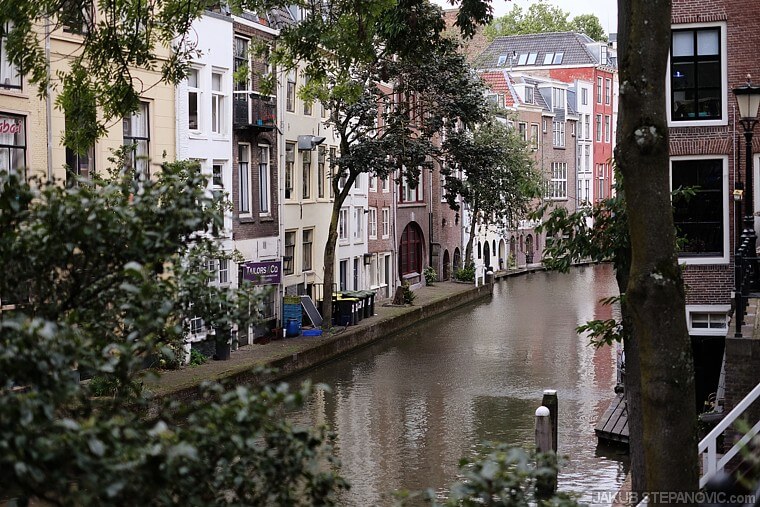
How I moved to the “low lands” of Europe with ambitious plans that didn’t really work. It was quite an escapade, let me tell you!
Once I realized that I couldn’t continue in the US, I researched where to move and start another chapter of my life. My plan was to go back to college, get a job eventually, and see how things evolve. After considering the pros and cons of many countries around the planet, I picked the Netherlands. Things I found online looked just right: it is fine to live there with English language only; I wouldn’t have to mess with any visas nonsense; the cost of living is OK; the study programs are good, and the tuition is reasonable; decent job market; beautiful cities; nice people… a sweet deal, right? But as it happens, things online don’t always reflect reality. But let’s start from the beginning.
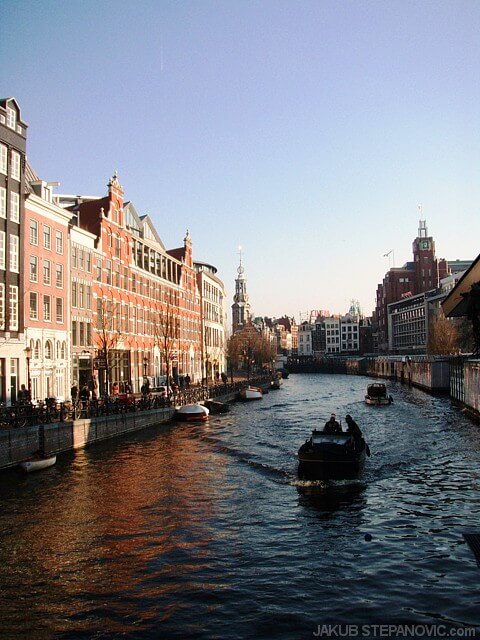
Prior to this visit, I was in the Netherlands once, back in 2007. I liked it, but it was just a short stay without many possibilities of experiencing the country closer. Pictured is Amsterdam.
The Netherlands is a flat country full of saturated colors. Greenfields contrast with bold architecture with large windows, whether it’s old neighborhoods from dark bricks or new city parts with modern skyscrapers. The nation is relatively small but with a rich history.
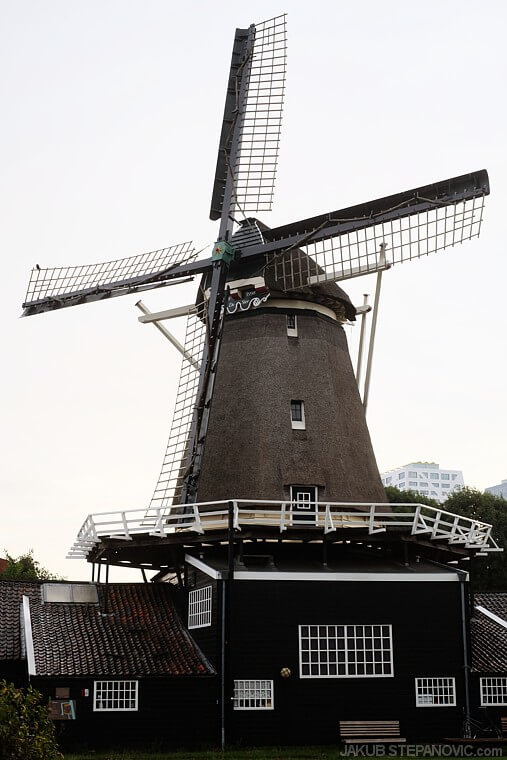
It has earned the world’s fame for its international trade, water canals, flower markets, and windmills, weed tourism, and finally, its usage of bikes. Let me start with the bikes, and I will try to get to the other things later.
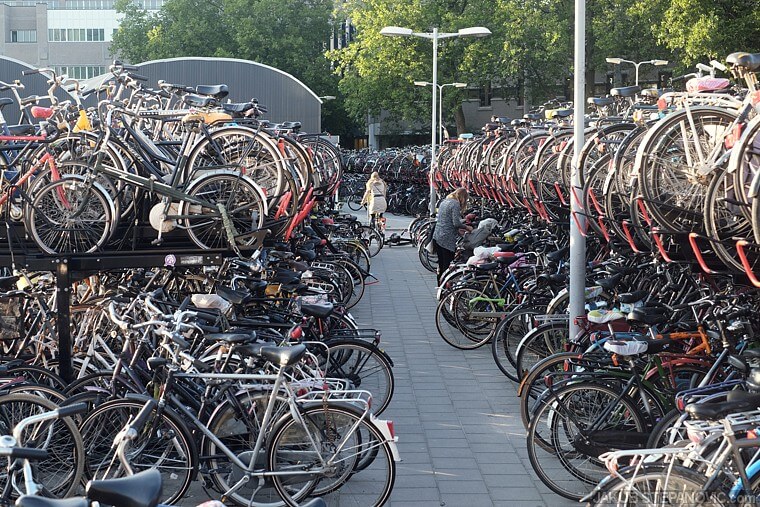
If you have seen a picture with thousands of bikes in front of a train station, office, mall, and so on, it was most likely the Netherlands. There aren’t many other places where you can see such a thing. China maybe, but its bike infrastructure lacks the edge.
Bikes are definitely one of the very first things you will notice once you visit the country: they are everywhere. One has to pay attention while walking / driving in downtown not to hit or get hit by one of them, but it isn’t rocket science. While it might seem like colossal mayhem at first look, it has its order that works very well. So, it takes only a day-or-so of practice, and one is set. There is an enormous number of designated bike roads, and each intersection has specified the right of way. Even bike parking has a system.
-

- There are parking garages and places where to put a bike nearly everywhere, but there are also “no parking zones.”
As a result, riding a bike is, for sure, the most convenient way to get around the city. I got one from a friend the first day I arrived, and after fixing the brakes in a MacGyver style with a Swiss knife and a pet bottle, I was ready to hit the city and get down to business; buy a local cellphone number, etc.
At first, riding in downtown reminded me downhill biking: Concentration is mandatory; otherwise, you crash in a second. Here it wasn’t trees and rocks, but other bikers. Bikers in front of you, next to you, bikers behind you… Navigating through was exhilarating. To raise the thrill a bit, over half of the bikers type a text or call someone, smoke, hold an umbrella, handbag, groceries, hold the hand of another biker, or everything together. Some even have, on top of the mentioned stuff, headphones on. I adapted to this quickly; many photos in this post are taken while riding a bike.. You know, holding a phone with maps in one hand, a camera in the second, and the handlebar in… oh, wait. You get the idea; Multitasking is a common practice here.
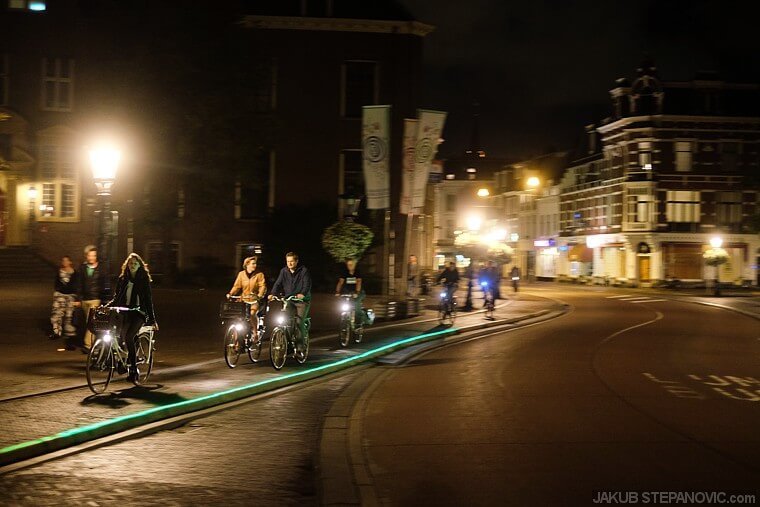
During the time I was there, I easily rode more miles than I did over the last year or so, just to get from one side of the city to another, back and repeat. Since the paths are flat with a perfectly smooth surface, it didn’t feel like any big deal, but it does cost a bit of activity. The Dutch biking system is like a free gym, but better; one gets the daily exercise, but as opposed to running on a treadmill, they get places, too.
Now, let me tell you about the city I moved in: Utrecht.
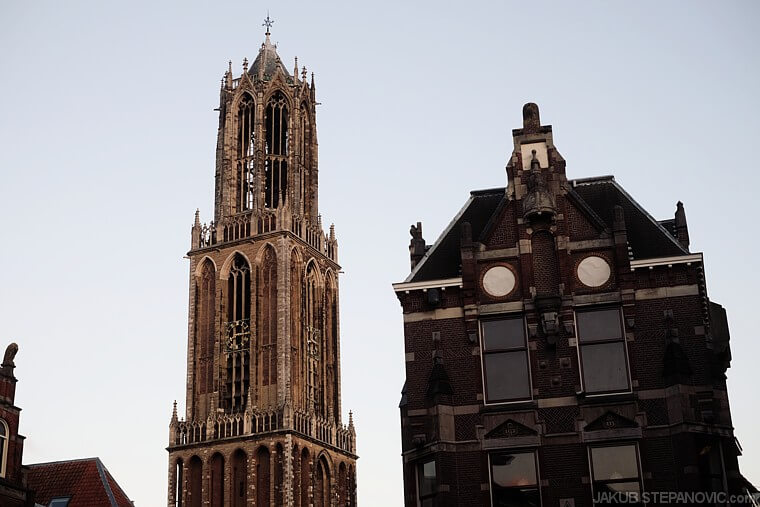
Dom tower, the tallest (113m /368ft) church tower in the Netherlands, completed in 1382.
Its history goes as far as 2000 years ago, and before it was surpassed by Amsterdam, Rotterdam, and The Hague (all of which are just an hour by train), it was the Netherlands’ biggest. Although nowadays the city ranks 4th in the population (with about 350,000 inhabitants), it has the 2nd highest number of cultural events per year, after Amsterdam. It is also the student town of the Netherlands, as it is home to a couple of highly-ranked Universities. All of Utrecht’s higher institutions together enroll about 100,000 students – a lot. As a result, 71 percent of the city’s population is under 45 years old.
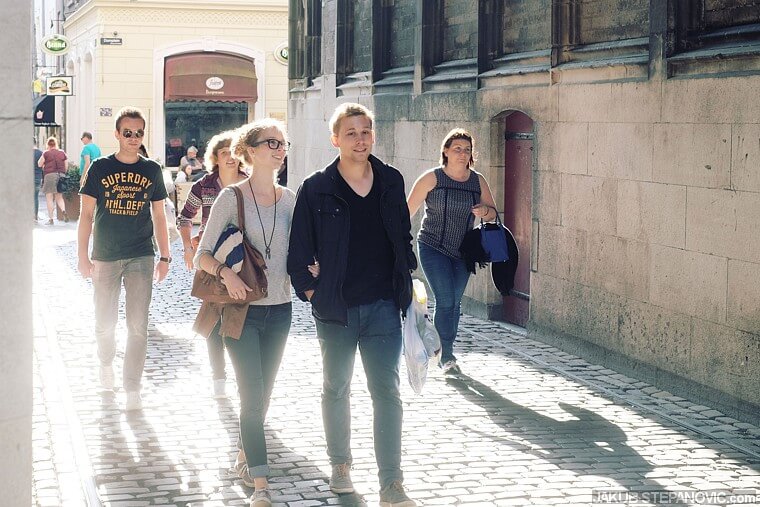
This contributes to its extremely vital downtown. No matter what day of the week it is, it looks like the entire population moves into the city center to spend an evening. There is a myriad of people everywhere. On every corner of a block is a restaurant, and they’re all full.
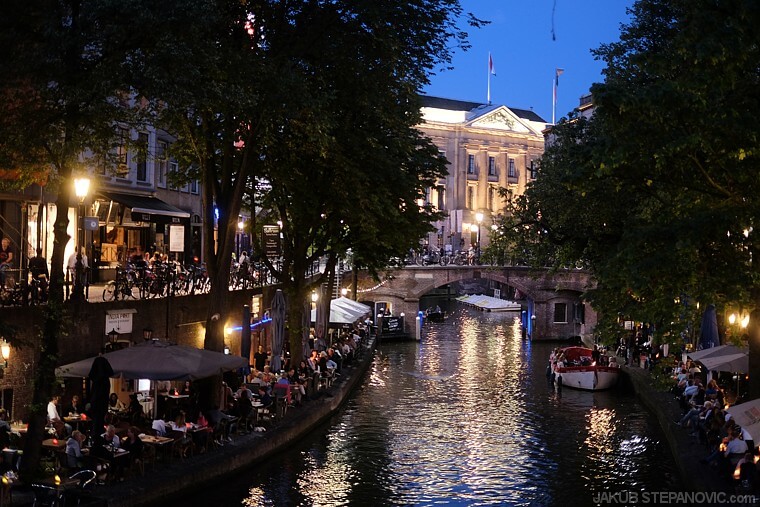
Note the tables next to the canal – hard to find a free place.
While on the topic of restaurants, Dutch food is tasty and healthy. It's brilliant, until you see the bill. In the US, I was used to paying 10-15 bucks for a decent meal, but it's easily $20 and up here in the Netherlands.
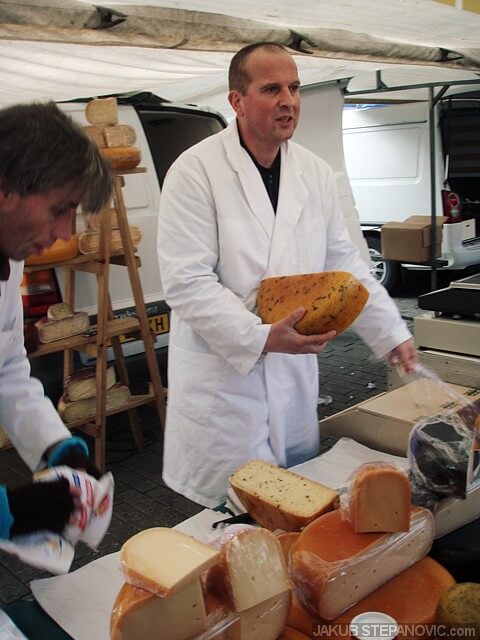
Cheese market in Rotterdam. they are so good! (a file photo I took back in 2007)
Streets are as loud as with people chatting or singing later in the night as the alcohol permille increases. At some point, it gets hard to capture anything as some happy being jumped in front of my camera every time I tried to take a picture.
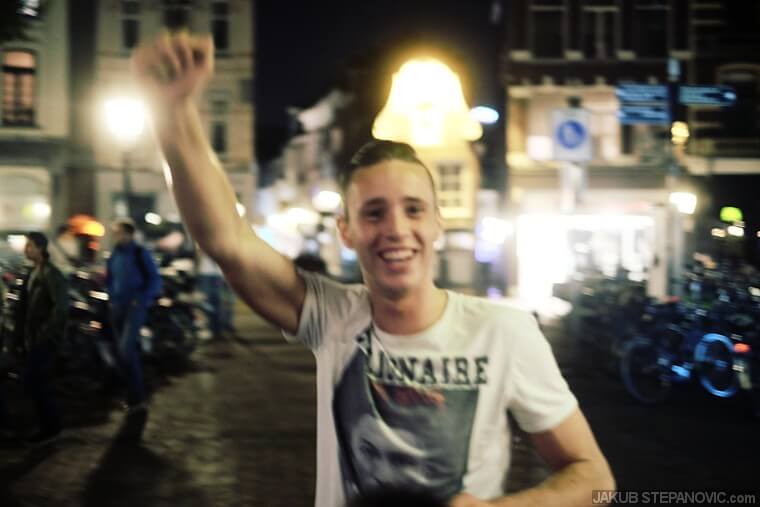
Another thing to say, you won’t get a coffee in the local coffee shops. In downtown, one can smell weed more often than regular cigarettes.
Let's get back to Utrecht's physical properties. I like to explore cities after sunset, as they all turn into different, more vivid colors. All the streetlamps, vehicles’ reflectors, and windows cast an artificial light around, making the scene dynamic. Even the most boring building during the day becomes more interesting at night if it is under a mix of light sources. Also, you can’t see all the mess like in daylight (but that’s not the case in the Netherlands, as it is clean). Speaking of lightning, Utrecht offers a show. Many places and structures in the city center are neatly lightened with a flair of art.
Reflectors enhancing the shapes of structures aren’t anything unusual, but they take them to the next level here: nearly every bridge over downtown canals is brightened with pulsing led lights, while they are constantly cruised by groups on boats, enjoying the moment with a glass of wine.
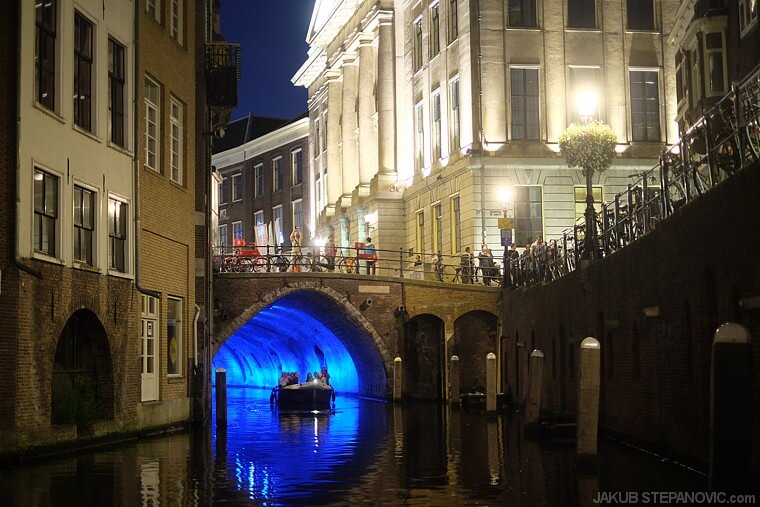
The same colorful situation is with pedestrian underpasses, changing colors constantly…
…and even windows of some buildings shine in intervals.
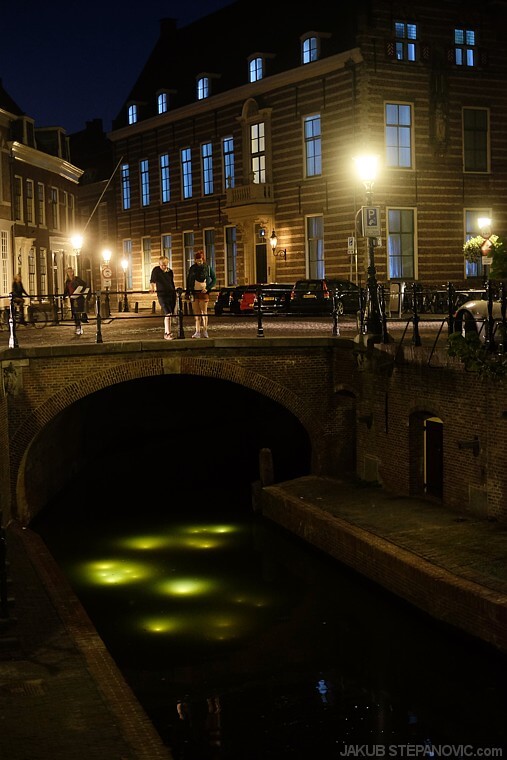
Note also the light coming from under the water: nope, that’s not a reflection.
But the coolest of all of them is this one:
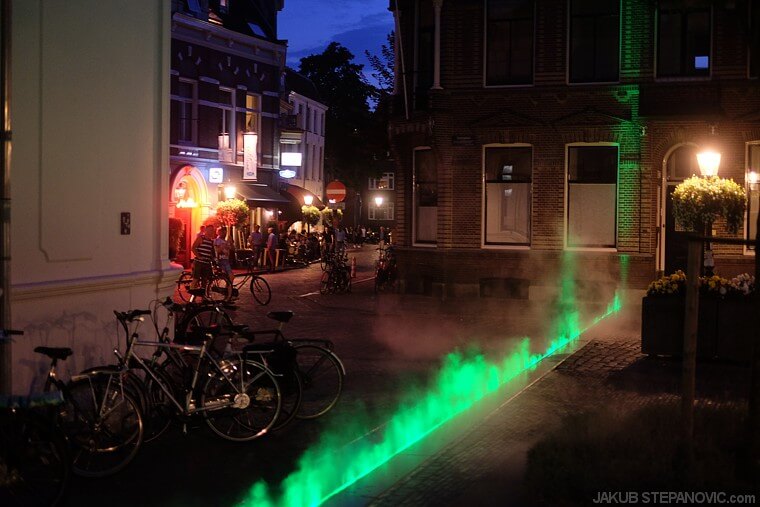
Every once in a while, this location produces a thin strip of haze backlighted by a strong green ray. It creates a wall of light, and it is ingenious. I was shooting handheld; a tripod with longer exposure would give this place more justice. But you can see my point.
Utrecht is a fun place to walk through, and there are plenty of things to discover. Besides the culture in the city center, it is a city where the old meets the modern.
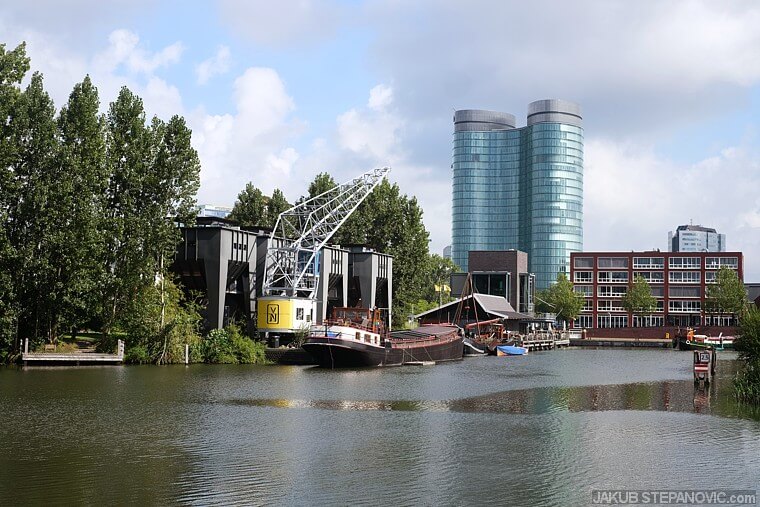
Rabobank (completed in 2011), the building in the background, is currently the tallest modern building in the city.
There are quite a few contemporary buildings already...
...but in 10 years, they’ll be filling every available space. There is a ton of new developments going on.
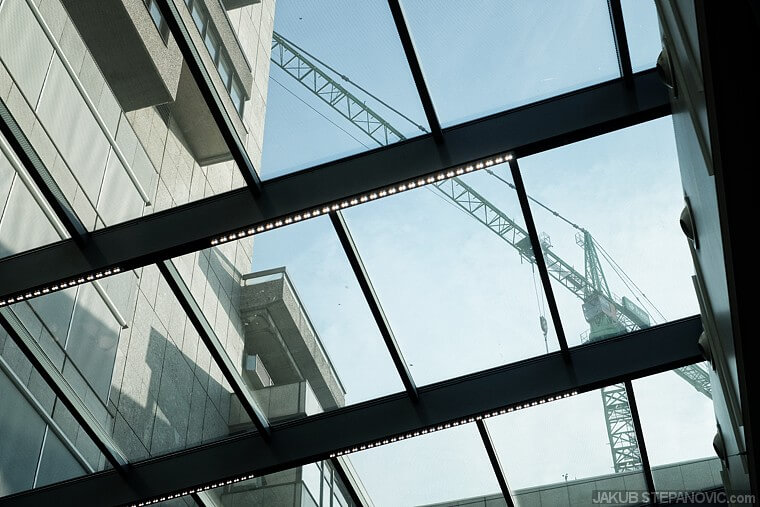
Large cranes everywhere
One of the recently built structures is this fancy mosque.
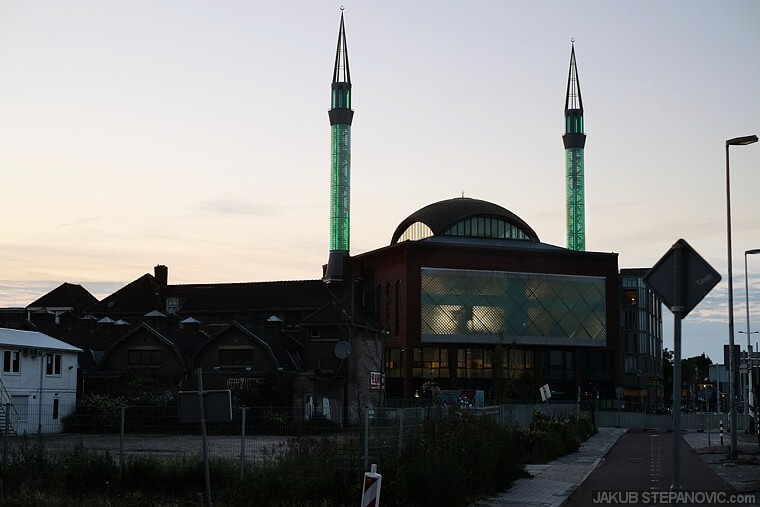
Not just the students, migrants from all over the planet also contribute to the fact that Utrecht is very multicultural, including many Muslims. I felt like locals here respected that, and it made me think that hopefully, one day, people will be more accepting everywhere. Try to set up a Christian church of the same size in some places in the Middle East now.
This moves us to another point, the people here: The Dutch are the tallest population in the world, so I don’t look there like some rare species with my two meters (6’6”) height. And because most of them ride bikes instead of driving everywhere, an average Dutch person is in far better physical shape than an average person in the States.
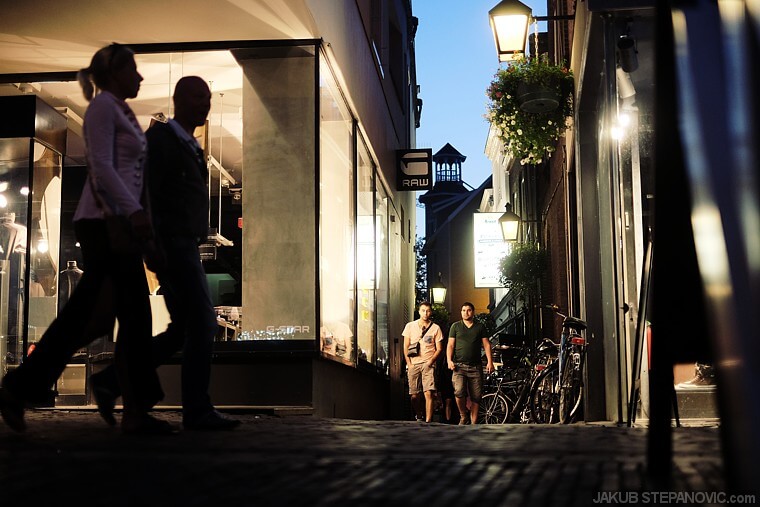
Unfortunately, those that I ran into weren’t nearly as friendly as I was used to with people in the US, which is a shame. On my first day in Utrecht, I asked a stranger for directions, and he said to give him five Euros first. So, I used my phone instead. The folks here are mostly taking care only of themselves, but if they think something about you, they will let you know it straightforwardly. That can be good, but it takes a bit of time to get used to. One of my first conversations here was talking with a girl at an information point, where she said: “You are trying to get a room here within a week? Pfffff, that’s madness.”
That brings me to accommodation. I knew that scoring a place to live might be a challenge here, so I started in advance: a couple of months back, I got in touch with a company that was supposed to rebuild an old house into students’ rooms, and they promised me a place; but just a few weeks ago I received an email saying, “We’re sorry; the city didn’t approve our reconstruction.” “Well, you just found that now?” I was angry and back at the beginning. Since then, I have had no luck in finding anything.
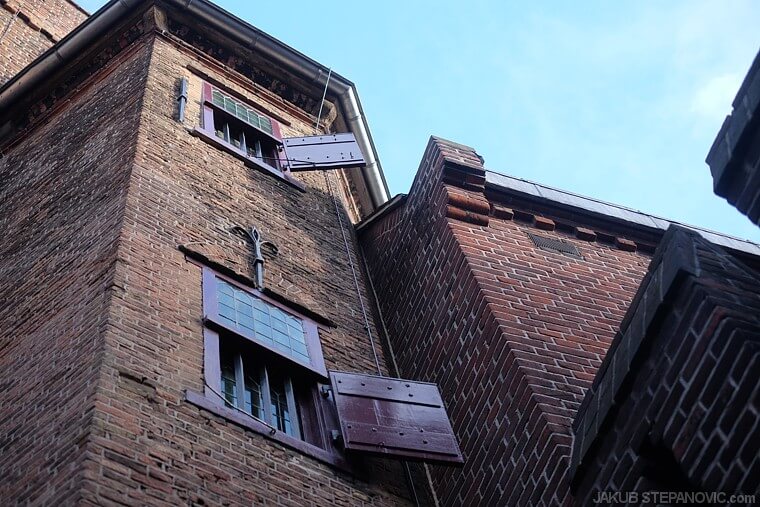
“Surely, securing housing would go better in person,” I thought, and I arrived a few weeks before the first day of school. I planned to stay in a hostel while searching for a room. However, every hostel I called replied with an annoyed voice, “We are full, full, and it won’t get any different.” If there was a space, it was just for one night max. The need to move every night would cost a lot of time and effort, so I decided to book a hotel for a week (uh, I know) and began my search. I was looking for a furnished room in a shared apartment in a range of €350-550 per month, including utilities. I was not too thrilled to go back to shared accommodation, but it was the only choice, as according to what I read online and discussed with the uni staff, one could get such a room from €300 up, while self-contained studios run for €1000+.
The reality turned out to be rather different. No matter that I applied for housing through real estate agencies – both online and in local offices, I joined many “room wanted” groups on social media and asked people around the town for help, but it didn’t go well. First, there was absolutely no way to get anything, even unfurnished, below €400/month. Then, if there was a furnished room for ~ €500/pm, it was only with “no council registration possible,” which means living in such a space is against the law. All the unfurnished rooms for around €500 that I saw were with many, um, compromises. They were either in a desolate condition with roof leaks, broken windows, and moldy bathrooms, or with roommates that wouldn’t work like people smoking packs of cigarettes daily or owning two dogs, each sized like a small car. Nothing against dogs but discovering the kitchen with a layer of dog hair everywhere was far from desirable at such rates.
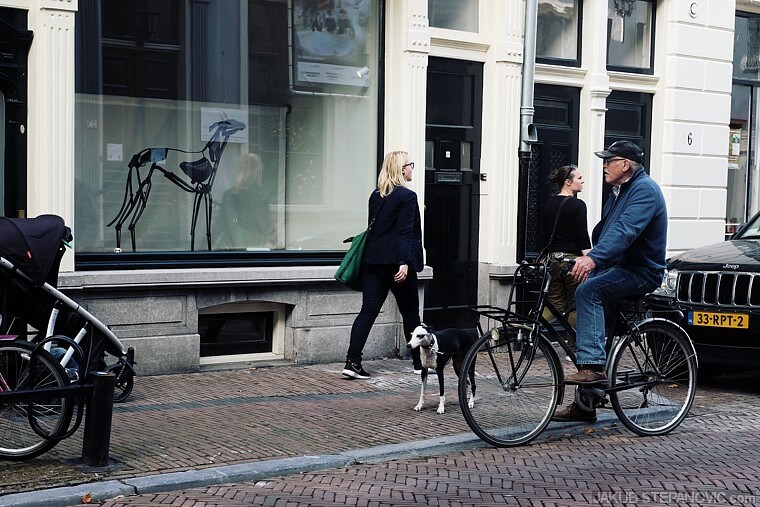
Speaking of dogs, here’s a guy with one who interrupted his bike ride to contemplate a dog sculpture in a storefront. Stories like this were on every corner.
My initial plan was to start with school and then find a job. Even before I moved here, I called the university to discuss possibilities of some work-study program, and the person I spoke with told me that they have some student jobs, but I will need to set it up with my “study coach” in person. “Great,” I thought and kept that in mind for later. But with the housing situation forcing me to fork out a much bigger sum of money than expected, I started to look for a job and went to find this coach before I had housing sorted. But instead of help, he said, “There is nothing like this offered; who told you that we do that?”
“Wow, this is getting better and better,” I thought and started checking the local job market on my own. Sadly, I crashed on another thing the Internet stated wrong. It said that it is not an issue to get a job in English. However, I was always asked, “…but you can speak Dutch, right?” and the job opportunities disappeared like bubbles from a cheap soda. Even at some, um, not so demanding positions, like washing dishes in a pub. Well, damn.
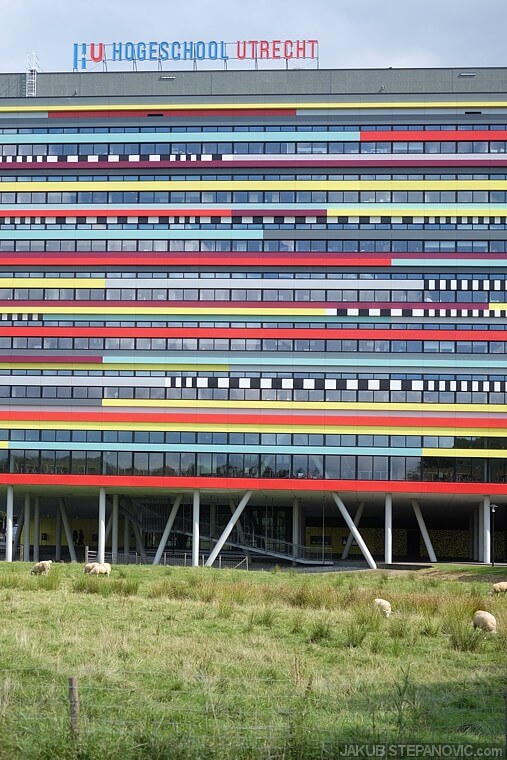
That’s the institution I planned to attend. From one side, one can walk into a herd of sheep; from the other is a large modern campus of universities’ buildings.
The language itself is interesting too, and it is something I planned to learn at some point. But Dutch is not something to master overnight; it is like if you’d put German, English, and some French in a blender and mix it for about 30 minutes. That being said, Dutch people usually have an easy time understanding those three languages, but anyone from any of those three countries has no clue what the Fu Dutch words like verschrikkelijk mean, and how to pronounce them. The Netherlands is, together with Norway, the country with the biggest percentage of English speakers in Europe out of the countries where EN is not their official language. The rate of the population that can speak English here is around 90%, which is even more than in Canada (85%). Sure, you can talk with people in English – mainly with younger generations – everywhere in western Europe, but mostly it will be with sort of broken grammar (kinda like this text). Dutch people are usually fluent in EN across all ages, and what’s also interesting, they have more of an American English accent than the British one. But anyway, it didn’t mean anything when I was looking for a job.
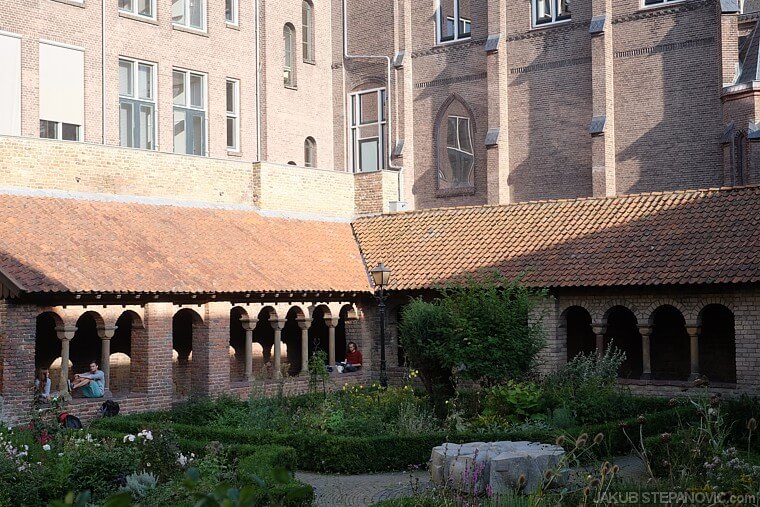
Back to the housing, the problem is that the universities here enroll more students than the city can accommodate. They know that, but they get money for every student, and that’s what counts. Other entities in the city are also aware of the miserable housing situation, and just like universities, they let the money talk first. As the academic year started, hotels jacked up prices by at least +€10 per night. Eventually, I had to leave my hotel for another one. I called around 20 places, and the cheapest that had a room available was €85 per night, without breakfast. The following day the case repeated. It is every man for himself situation, assisting students just not gonna make them rich, is it? Someone in the uni said that more than half of freshmen students won’t make it through the first year. That's the kind of statistics I didn't see before coming here. Tough luck.
A few days later, I was getting fed up with all this mess. If I’d have some warranty of finding something soon, but it just didn’t look like I’d get lucky this time. I started considering whether the Netherlands was a good idea. I didn’t want to just quit, but in the current light of the accommodation-work-school combination, there would be a good chance that I’d have to quit after a year anyway, with no result, no diploma, and with my savings gone. “That would suck,” I thought. “If I am about to burn a year and money, I might as well do it somewhere where I can properly function and get along with folks.”
Finally, one day I didn’t reserve anything and went into the railroad station instead, to put my stuff into one of the storage boxes there. The station was around three miles (~5km) from the last hotel I stayed in, so to get there, I strapped the luggage behind my bike as if it was a trailer, and amazingly, it worked a treat.
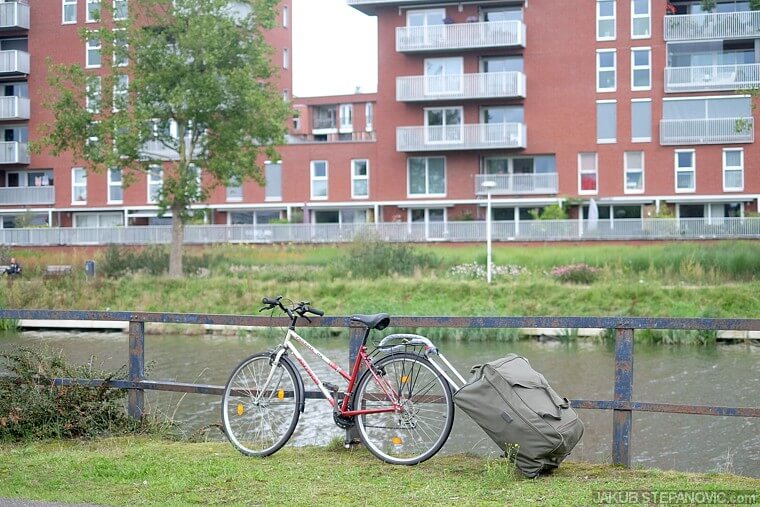
The luggage didn’t break, and I even managed to fit it into a small storage box at the station. With this solved, I used my cellphone to connect my laptop online and kept looking for a key to my problem. Nothing. I thought about what the best step would be now and ended up figuring that the Netherlands is likely not going to be sustainable this time. So, I took a pic of my bike, posted it online, and had a buyer immediately. But before I sold it, I went for the last ride to see a bit more of the city. Just to sightsee and relax on this occasion, since my head was one big “Wtf is happening,” and I needed to sort my thoughts.
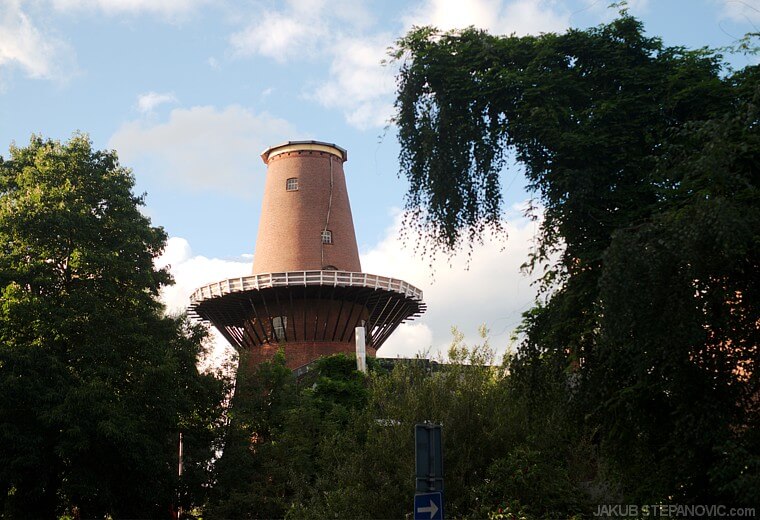
Rijn en Zon, a flour mill from 1912-1913.
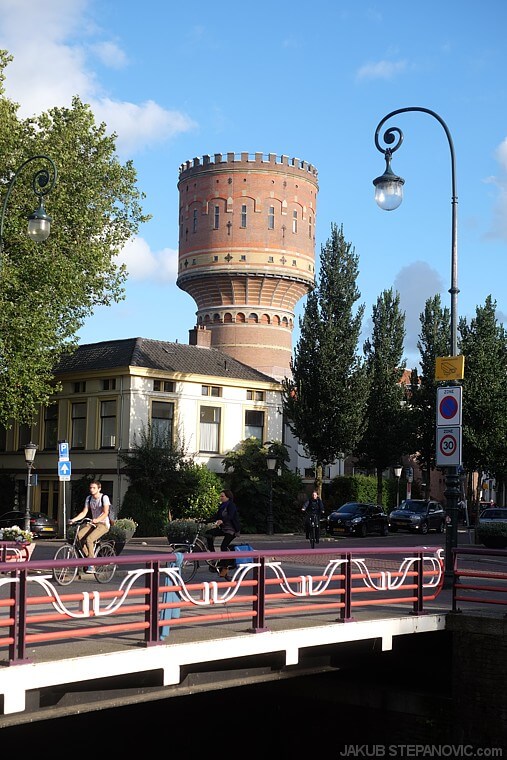
One of the city’s water towers.
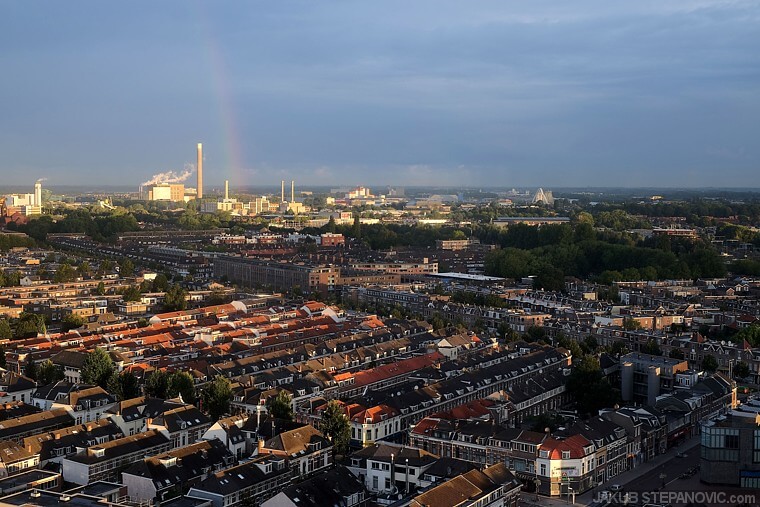
A rainbow comes from a power plant.
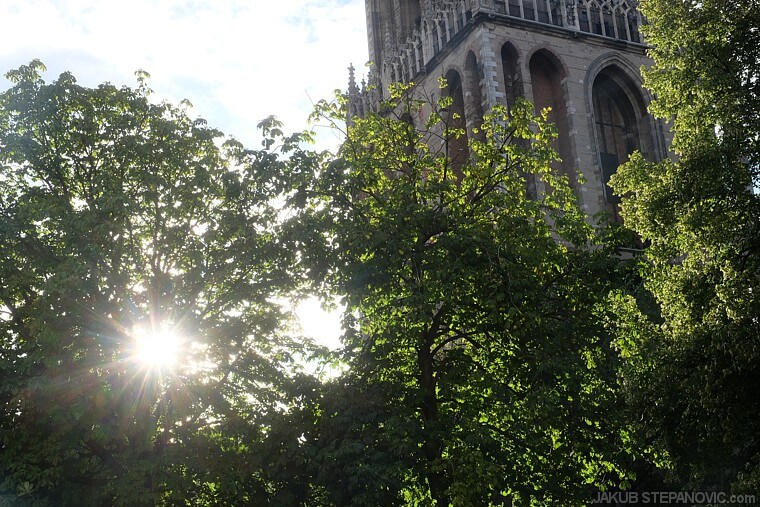
Once without a bike, I continued on foot through downtown. I was still confused and lost, but otherwise, it was a lovely evening.
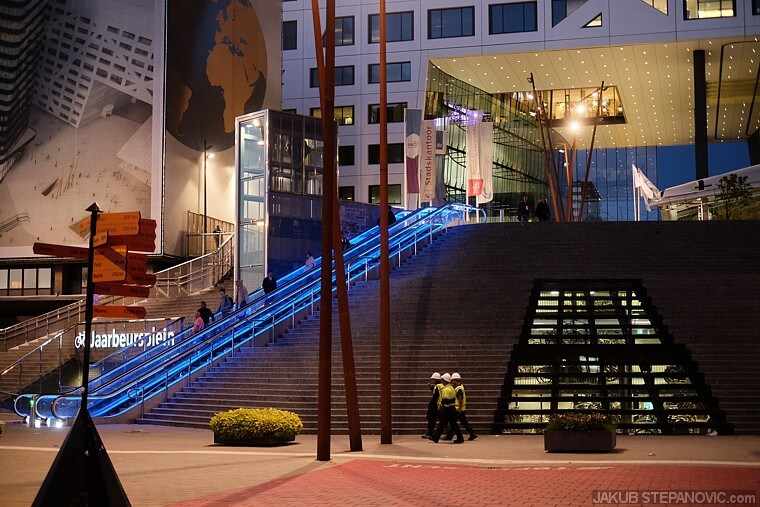
Suddenly a guy approached me: “I’m homeless, but I’m trying to save, would you be kind and give me one Euro?” Like most big cities, Utrecht has a homeless population too. Honestly, with the housing situation, there is no surprise. I just looked into his eyes, and with a self-surrendered face, I said: “I’m homeless too,” and had no more questions asked.
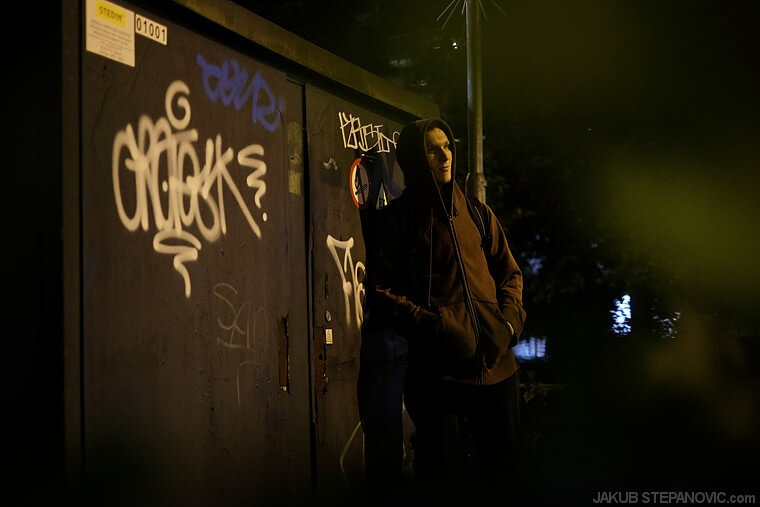
homeless selfie-time
It was already dark when I began to think about my options on where to sleep that night.
In other words, I checked out local bridges and so on. But they were mostly already occupied (with various levels of life)...

…I kept walking, enjoying the city at night to eventually get some sleep in a park. It was cold.
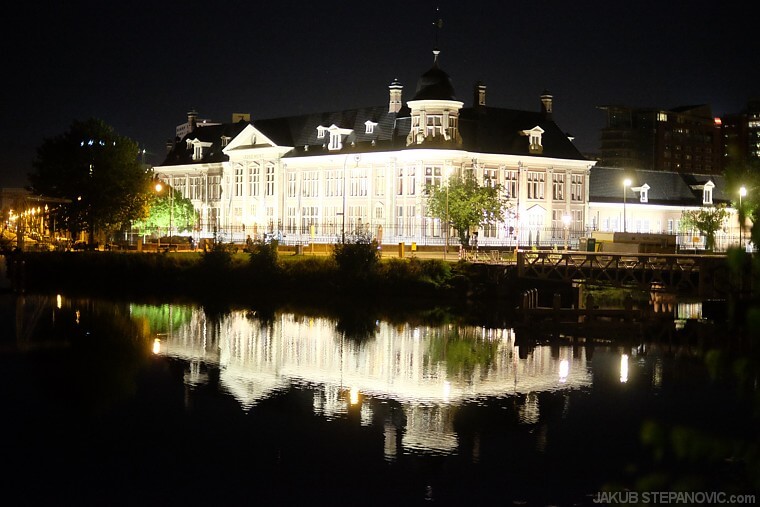
The new day’s search didn’t bring anything new job/housing-wise. But I found a place inside a building. Some say it was a construction site of one of the new developments; some say I crashed a penthouse party; others think this is all a myth. Either way, when I woke up in the morning, I got to see a sunrise from a decent perspective…
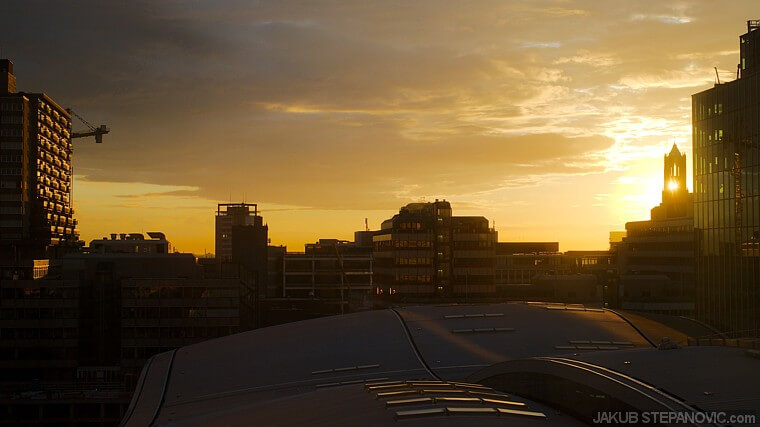
The rising sun intersects with the Gothic bell tower.
Not a bad way to start a day, that’s for sure. After watching the city for a while, once again I searched if a miracle in the housing or the job market won’t happen.
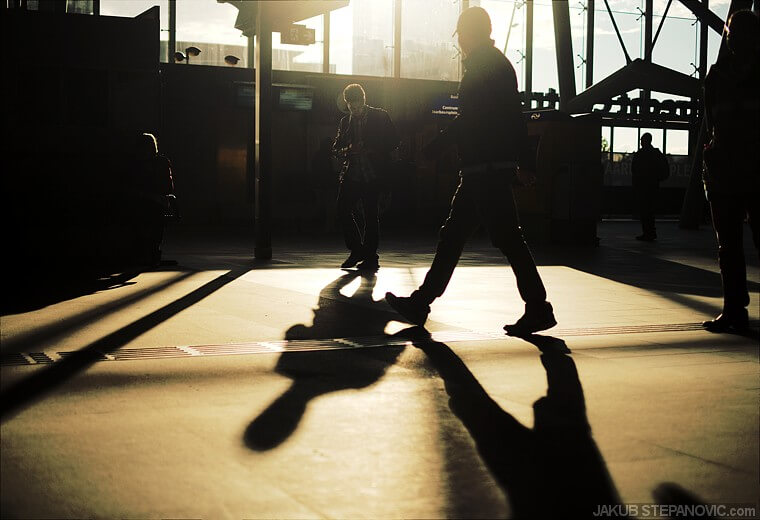
Sunset at the station
It didn’t by the late afternoon, so I went for the last walk around and then pick up the luggage from the station, and I boarded a bus that took me away from the Netherlands.
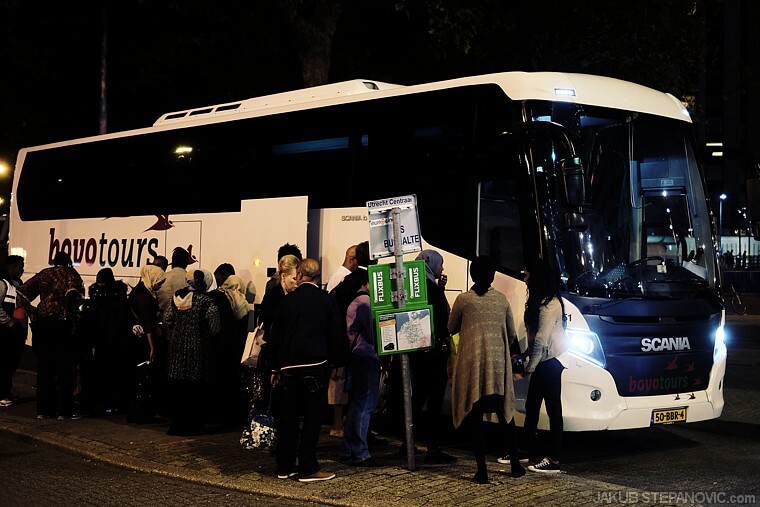
Yep, I moved again. I skipped the new chapter of life in the NL and jumped straight into another one. Yep, I didn’t see this coming either. Missteps happen. Life isn’t about planning everything from A to Z because that never works; it is about taking challenges and responding to all unexpected things in the best ways one can think of. This time, my response was to move to the UK. I am exhausted but excited, looking forward to the new adventures. And you can look forward to pics from London.
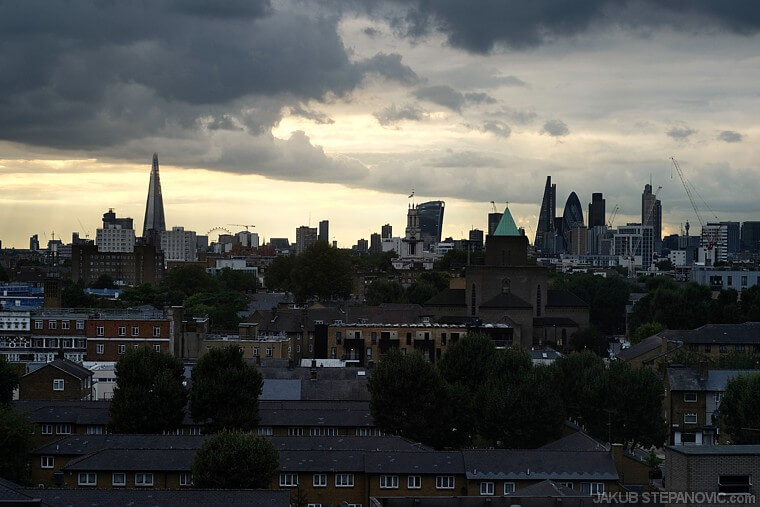
.. That's where I’ll be based for a bit.
Thanks to all of those who reached out with support; thank you for reading.
Edit, July 2016: After I moved out of the country, I thought that I was done with this chapter. Alas, my “Netherlands Experience” had a rather unpleasant aftermath; it took another ten months to settle all the cases.
If you are interested, click here to expand the sequel of the story:
At the moment I started to figure that the NL might not work, I went to the uni information desk point asked about their enrollment cancellation policies, especially regarding tuition payments. Just in case. The university’s employee explicitly told me that I wouldn’t have to pay any fees as long as I’ll withdraw before the 10th of September. I followed the instruction and did it prior to that date; in fact, I did it before any lectures commenced. I submitted the cancellation via their online system, but they haven’t gotten back to me with a confirmation besides an automated reply thanking me for submission and saying that they will process it. This didn’t seem too odd, as the communication during my application process several months ago wasn’t stellar either. I thought that this was just the way it is. However, about a month later, I received an email from the university apologizing for the late response, followed by a statement that I will have to pay the tuition.
“It has to be some mistake,” I thought and wrote them a polite objection, explaining that I followed instructions given to me by a person in charge at their own information desk. This email received a prompt response, letting me know that the “colleagues at the Student Information Point have informed you incorrectly” and that I need to pay. But they offered that I can submit a remonstrance about this case. Clearly, that’s what I did. However, again, I got no reply, no resolution, or a message that the matter was in progress. Since I had no information about their decision, I did not pay a thing.
Meanwhile, I got many emails offering me some housing in the Netherlands. Most emails I received from a company that said that they will get in touch with me as soon as they have a room, within a week. – It wasn’t a week; the first offer I received from them was over a month later when I was in London already. Every time I got such an email, I replied that I was no longer in need of accommodation and that I’d appreciate it if they would remove my email from their database. Depends on the company; sometimes, it took one reply to solve it; other times, I had to send them dozens of emails before they finally got the memo that I was not going to do business with them. Frustrating.
Time flew, no communication, no update. “Maybe it’s all over,” I guessed. But then, about a week before Christmas, I received a mail – not from the uni, but from a Dutch debt-collecting company, informing me that execution will follow if the sum isn’t paid in full within a few days. “They lied to me, and now I have to pay for the mess? ... Lovely gift!” I sighed and began to read a ton of documents about the Dutch law system and whether there was any chance to repeal this nonsense. But I did not find out anything reasonable I could do besides paying them. So, that’s what, with great sickness, I did.
Sod it! This was a huge hit to me; I suddenly forgot all the good about the Netherlands altogether and said that this was the last money they’ll ever see from me. No way will I fuel at Shell, buy their cheese, and whatever else they produce. I also voiced the issue around me – if my friends were about to buy some Dutch vegetables, I deployed a persuading speech concluding with something like “Such purchase will contribute towards the greater evil on this planet.” I know that one should forgive their enemies, but since they showed absolutely zero sympathy for me, I adopted their approach towards them. I wasn’t happy with the situation, and I wanted to extend the reach of my story.
At the end of January, I was getting ready to submit the case to some television, making it blow to the broad public. However, before I did, I received a mail from the Faculty Director’s office that my objection had escaped their notice, and I’ll have my fees refunded. My first reaction was, “An institute of communication and journalism has a response time of four months?!” But this was instantly erased with an optimistic vision that things would actually turn out fine. If there’s a way to solve this peacefully, yes, I am all in.
So, I provided them with all the details needed to complete the transaction and waited. It was March already, and nothing had happened. After I sent a kind reminder about the situation, I received a reply saying that I have to contact a different office about this; it’s not their thing. So, I sent another email to the office they mentioned, only to get that they can’t do anything in this matter either, but that I should contact yet another office. The following month I spent sending emails to addresses I was given, but with no result. Damnit, but I kept going. Instead of sending an email to one address at a time, I searched for every possible uni email I could find, added them to the receivers list, and sent another request for an update. After another two weeks of no communication, I repeated the procedure again. And again, after another week. Finally, things started to move.
Still, it was far from a smooth finish. They said I need to pay them a manipulation fee first before they send the refund. “Nope,” I thought. The Faculty Director’s office said nothing about any extra charges. So, instead of responding and paying them more money, I sent my case to all the departments of the uni instead. Days passed when I got an email stating: “It has been paid yesterday.” Pfff.
Back in Utrecht, one of the university’s faculty members said that “If it ain’t Dutch, it ain’t much.” However, I experienced a version where “If it is Dutch, it’s a massive pile of troubles and complications.” Maybe I just was at the wrong time with the wrong people, maybe. No one will return the time, nerves, and banking fees I lost during this, but the tuition was indeed refunded, and it was an interesting life experience. Since the case eventually ended the way it did, I might buy Dutch cheese one day again.
Edit, July 2022: The story goes on. Many things happened since moving to London; multiple countries and two university degrees later, I started to think that seeing the Netherlands again with different eyes could be interesting. I came here earlier this month.
At first, it felt like I picked it where I left off: After I arrived in the country by train, I boarded a bus and wanted to buy a ticket from the driver. The card reader didn't work, and the driver didn't take cash. He sent me to get a ticket from the station. "Could you wait for me?" I asked, and the driver nodded. "Great!" So, I ran into the station, got a ticket asap, and ran back. Only to find out that the bus was gone. "Oh-uh!" But that was it! Since I got on the next bus, believe it or not, it's been an absolute pleasure. I've liked what I saw, I've met fine people and was given opportunities to reflect on changes, circumstances, second chances, and many other topics. I will write something about it later; stay tuned.







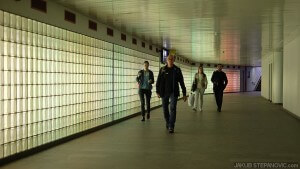
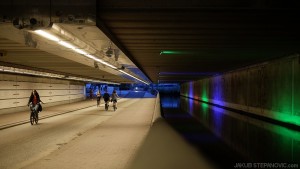

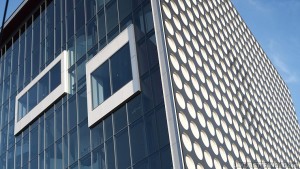





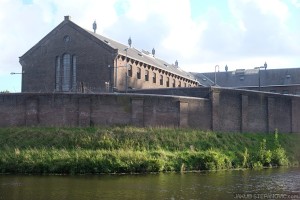




Regina Murphy
January 1, 2016 at 15:59
I’m sorry NL didn’t work out, Jakub! But you made it through safely, saw some amazing things and had a grand adventure. Onward and upward!
Comments are closed.
Susan Copas
January 1, 2016 at 17:20
I read this when you first posted, but it was nice to read a second time after visiting Amsterdam. The bicyclists were terrifying. I would look and look, and just when I thought it was safe to cross a street…
Comments are closed.
Teresa Wehmeier
November 16, 2017 at 03:13
Jakub, I find your writing compelling, and read every word. Your photos work well to illustrate your experiences. Good job, and thanks for the heads up on NL.
Comments are closed.